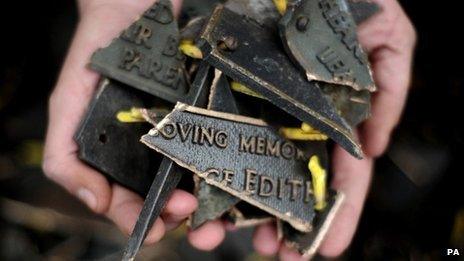Metal theft: Tougher powers unveiled
- Published

Theft from war memorials is in focus as Remembrance Sunday approaches
Measures intended to "stamp out" metal theft with bigger fines for rogue traders and stronger police rights of entry to scrapyards are to be unveiled.
There are about 1,000 metal thefts a week, costing the UK some £220m a year.
Minister Jeremy Browne will unveil the powers at a war memorial in Erith, Kent, that was damaged by thieves.
There is already a national taskforce focused on the issue - it was set up a year ago by the Home Office with £5m in Treasury funding.
The new measures - which will include a halt to scrap being sold for cash - come ahead of a bill tabled by Richard Ottaway MP which is making its way through parliament.
The Scrap Metal Dealers Bill, external aims to reform the industry and tackle what Mr Ottaway calls "outdated legislation" from 1964.
'Cast a shadow'
Three days before Remembrance Sunday, Mr Browne, the crime prevention minister, will speak of government determination to "stamp out this illegal trade, which in recent years has cast a shadow over... bereaved families".
He will say that thieves targeting commemorative plaques and memorials "show an utter disregard for the memory of the courageous men and women who paid the ultimate sacrifice for their country".
Mr Browne will insist that any new laws must be supported by "effective enforcement".
"That is why I welcome the success by the police in bringing thieves to justice. We are now seeing significant reductions in metal crime across the UK."
In October, the War Memorials Trust said thefts from its managed sites had fallen by two-thirds in the past year, but warned that there was still a worrying number taking place.
Frances Moreton, the trust's director, said: "It is always distressing when attacks on war memorials take place but particularly so at this time of year when communities gather for their remembrance services."
The new powers will come into force on 3 December.
- Published29 July 2011
- Published21 May 2012
- Published2 November 2011